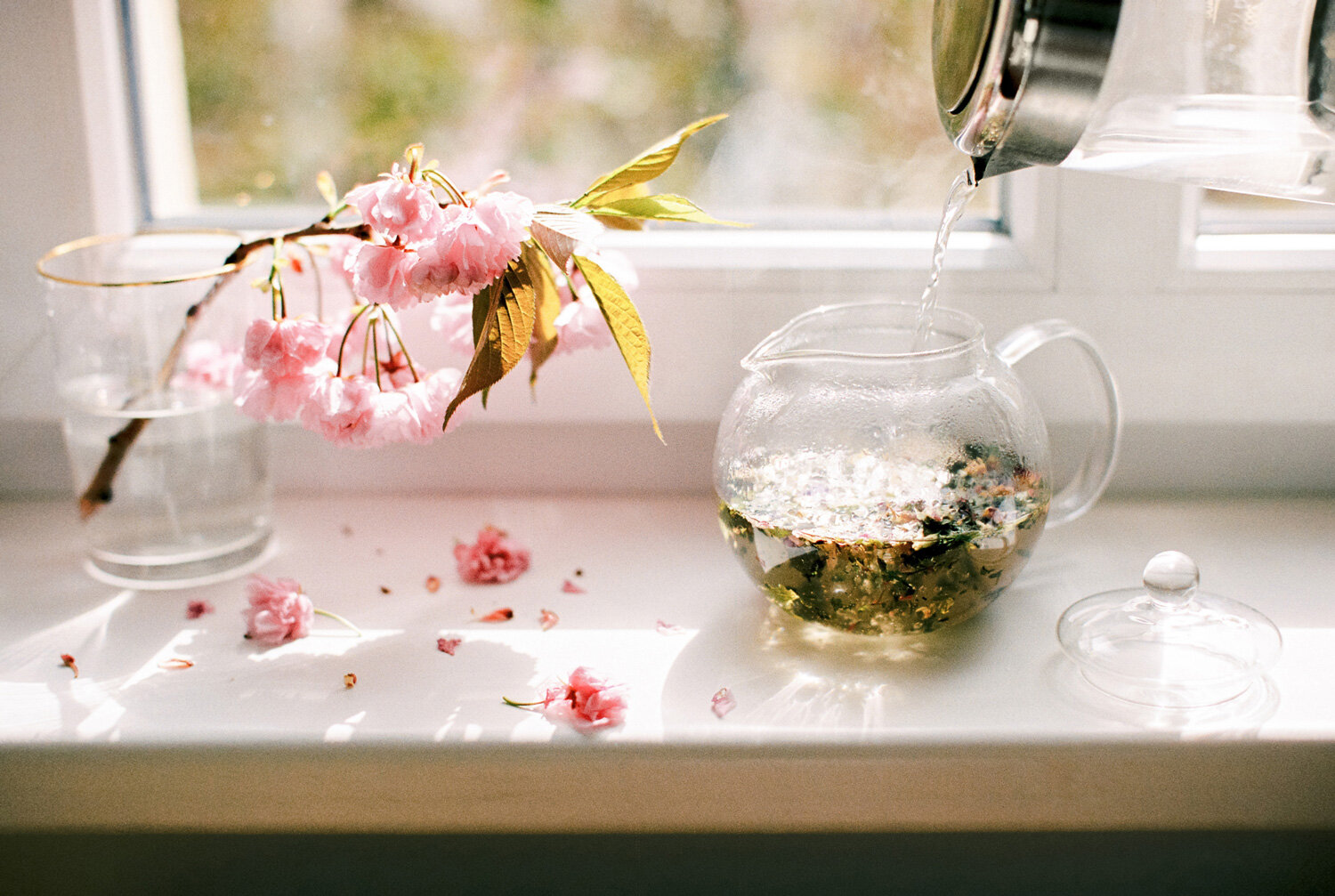Allergen-Friendly At-Home Herbal Infusions
The power of plants is as varied as it is profound. Plants are allies, medicines, and of course, friends to humans and non-humans alike! One of my favorite ways to enjoy plants is through herbal infusions. While many of us are familiar with herbal tea (think the peppermint or chamomile tea bags we get at a local coffee shop), there are hundreds of herbs to work with in a variety of ways. Infusions are loved by herbalists, as they are a deeply medicinal way to enjoy plants. Best of all, they are naturally allergen-friendly! Most infusions are “Top 9” allergen-free.
What is an herbal infusion?
An herbal infusion is essentially an herbal tea brewed for a minimum of four hours or overnight. The extended steeping time allows for the water to extract more of the “good stuff” from the tea, including vitamins, minerals, and other medicinal compounds.
How do I make an herbal infusion?
The process is quite simple! I typically use a 32-ounce mason jar, but any larger size should work. A French press works great as well. Grab your vessel and add one tablespoon of dried herbs per one cup of water. Boil your water, and when it’s ready, pour it over your dried herbs, filling the jar. Be sure to cap it as soon as possible, and then you’re basically done! Just wait four hours to strain, or make your herbal infusion before bed and strain it in the morning. Enjoy your infusion at whatever temperature you’d like!
Infusions are best consumed the same day, but will last in the fridge for 2-3 days. If you leave it longer, use it to water your plants!
What should I put in my herbal infusion?
There are hundreds of herbs to explore. Choosing which herbs to include depends on your health goals—perhaps you are looking to work on digestion, stress, or overall wellbeing (or maybe all three?!)—and taste preferences. Some herbs are relaxing, while others are energizing. Always do a bit of research on the herbs you’re looking to add to ensure they are not contraindicated with any health conditions or medications you’re taking—always ask your local herb shop, doctor, or an herbalist, if you’re unsure.
One of my favorite infusions—a go-to for many herbalists—is stinging nettle. Stinging nettle is incredibly nutrient-dense, and creating an herbal infusion using this special herb is essentially like drinking a multivitamin. It’s even used for reducing arthritis pain and treating seasonal allergies! Stinging nettle can be quite drying, so you may want to add a moistening herb, like marshmallow root, to your brew.
Below is a great calming infusion recipe, if you’re looking for somewhere to get started.
The hashtag #herbalinfusion on Instagram is also a great source for inspiration.
Calming Nourishing Infusion
1 tablespoon stinging nettle
1 tablespoon tulsi (holy basil)
1 teaspoon lemon balm
1 teaspoon marshmallow root
Add to 32-ounce jar, top with boiling water, and let steep four hours (or overnight).
You can grow your own herbs, purchase them from a local herbal apothecary, or buy them from an online shop. Always opt for organic when purchasing, as you are steeping these for quite a while, and you don’t want to ingest anything that’s been sprayed on the herb.
What herbs should I avoid?
If you have a wheat allergy, gluten intolerance, or celiac disease, you may want to avoid oat straw or milky oat tops. While a soothing tonic to our nervous system, like all oats, they may be cross-contaminated with gluten-containing crops.
Very fragrant herbs, such as chamomile, can turn bitter when used in an overnight infusion. It’s a taste preference—just know the bitter is medicinal!—but you may not enjoy it. Same with other fragrant flowers like lavender. It’s something to experiment with and modify accordingly.
A few last thoughts
Herbal infusions are an easy, approachable way to consume herbs medicinally. During summer, feel free to pick cooling herbs (like peppermint!) and/or serve your infusions iced. They’re a great way to provide your body nourishment, while also optimizing overall wellbeing and health.
Sláinte!
This article is not intended as professional medical advice, diagnosis, or treatment. Always seek the advice of your physician or other qualified healthcare provider.
Sara Weinreb is a writer, intentional business strategist, herbalist, and host of the Medium Well podcast. Sara’s writing on sustainability, wellness, mindful living, and mission-driven business has been featured in Forbes, mindbodygreen, USA Today, Byrdie, and Cherry Bombe, among others. When she’s not writing and shopping in the bulk section of health food stores, you can find Sara on the yoga mat, making herbal elixirs, having solo dance parties, and hanging out with her growing collection of plants. She shares her adventures and misadventures at @saraweinreb.

